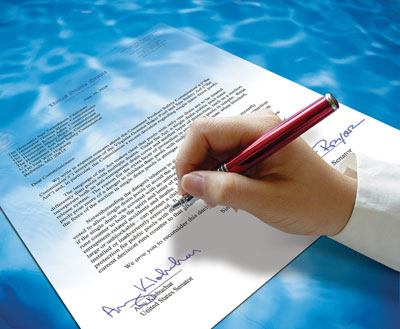Protests against CPSC’s interpretation of the Virginia Graeme Baker Pool and Spa Safety Act have ratcheted up, with nine members of Congress joining the ranks.
In late May, the Pool Safety Council waged a letter-writing and petition campaign objecting to the finalized version of VGB coming from the Consumer Product Safety Commission.
In early June, the nine politicians signed letters to CPSC, stating that the agency’s interpretation of the law did not do enough to prevent entrapment or abide by the intent of the act.
Four House members signed one letter, and five Senators another.
The House members include VGB author Debbie Wasserman Schultz, D-Fla.; Connecticut Democrats John Larson and James Himes; and Republican Frank Wolf from Virginia. It’s notable that Connecticut was home to a high-profile entrapment incident, and Virginia was where the law’s 7-year-old namesake, Virginia Graeme Baker, lived.
The senators include Amy Klobuchar from Minnesota (where 7-year-old Abigail Taylor suffered an evisceration); Bill Nelson, D-Fla.; Chris Dodd, D-Conn.; Mark Pryor, D-Ark.; and Assistant Majority Leader Dick Durbin, D-Ill.
Both letters took issue with CPSC’s decision to define an unblockable drain as one that has a specified cover, regardless of sump size.
Once it is considered unblockable, a single main drain no longer is required to have a backup device, such as a safety vacuum release system.
The letter writers believe the new definition for unblockable drains leaves pool users vulnerable.
“A dangerous drain outlet is not safe just because an ‘unblockable’ drain cover is installed,” Congress member Wasserman Schultz said through her spokesman, Jonathan Beeton. “Drain covers can and do come off, or they can be improperly installed. … The VGB Act is very clear that multiple layers of protection are needed.”
The House letter also revisits what has been a hot-button issue throughout the formulation and interpretation of the legislation — whether backup devices should be required on all pools, even those with multiple drains.
“Backup protection should be installed for every pool or spa, regardless of the number of drain outlets, unless there is no drain, or the drain itself is an unblockable drain,” Wasserman Schultz said.
Furthermore, the House letter reiterated a theme found in the previous campaign waged by the Pool Safety Council. “We understand that the interpretation that CPSC adopted is the same one that the pool and spa industry endorsed, and it is not the interpretation that public interest groups and victims’ families had urged the Commission to adopt,” it stated.
CPSC has acknowledged receipt of the letters, but it is not known yet if, or how, it will act in response.
Some industry members agree that every single-drain pool should have a backup system, period. But others observe that these devices can’t prevent all types of entrapment and may even create a false sense of security.
“An owner can easily be lulled into thinking, ‘Well, I’ve got a backup system here. … I’m safe, so I’m not going to worry about this cracked or broken main drain cover,’” said Leif Zars, head of the committee in charge of writing the ASME drain cover standard and owner of Gary’s Pools in San Antonio. “That’s a dangerous approach.”
Therefore, some in the industry say, the focus should remain on keeping the drain cover in place. If the drain cover comes off, they add, the pool should be shut down until it is secured.
That logic doesn’t sit well with Wasserman Schultz. “There is no evidence that backup safety systems foster a false sense of security,” she said. “This is like saying people won’t fix a broken seat belt because they have air bags.”
For CPSC to change its interpretation of the law, new meetings would have to be initiated by an official.
“The agency has a long tradition of being responsive when members of Congress write in,” CPSC spokesman Scott Wolfson said. “We take the comments and concerns of members of Congress very seriously. …”
Wasserman Schultz said she may step in. “I am not ruling out the possibility of introducing new legislation, but hope the agency would tackle this issue on their own,” she said.




